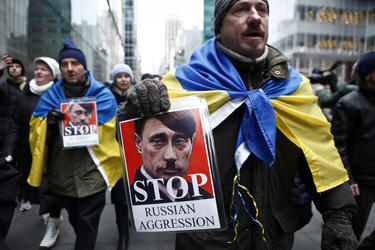Russia blames NATO for Russia's neighbors being nervous about Russia
Kena Betancur/Getty Images


A free daily email with the biggest news stories of the day – and the best features from TheWeek.com
You are now subscribed
Your newsletter sign-up was successful
On Thursday, Russia's foreign ministry had some tough words for NATO. First, let's start with what Russia got right: The North Atlantic Treaty Organization, founded to counter the threat of Soviet expansion in Europe, has gotten a new lease on life after Russia gobbled up Crimea through a combination of electoral hijinks and stealth warfare. And Russia's westward-looking neighbors really are vocally nervous that they could be next on Russia's menu.
But when the Kremlin accuses NATO Secretary General Anders Fogh Rasmussen of essentially yelling "boo!" the lack of self-awareness is darkly amusing. Here's the relevant sentence: "The constant accusations against us by the secretary general convince us that the alliance is trying to use the crisis in Ukraine to rally its ranks in the face of an imaginary external threat to NATO members and to strengthen demand for the alliance... in the 21st century."
So, Poland, Finland, and the Baltic states Lithuania, Latvia, and Estonia are nervous and clamoring for NATO assurances not because Vladimir Putin is showing an apparently growing appetite for taking chunks of smaller neighbors under the pretext of protecting those countries' ethnic Russian minorities, but because NATO is pointing this out. Got it?
The Week
Escape your echo chamber. Get the facts behind the news, plus analysis from multiple perspectives.

Sign up for The Week's Free Newsletters
From our morning news briefing to a weekly Good News Newsletter, get the best of The Week delivered directly to your inbox.
From our morning news briefing to a weekly Good News Newsletter, get the best of The Week delivered directly to your inbox.
Rasmussen does. "I have this message to Russia," he said Thursday: "You have a choice to stop blaming others for your own actions, to stop massing your troops, to stop escalating this crisis, and start engaging in a genuine dialogue."
A free daily email with the biggest news stories of the day – and the best features from TheWeek.com
Peter has worked as a news and culture writer and editor at The Week since the site's launch in 2008. He covers politics, world affairs, religion and cultural currents. His journalism career began as a copy editor at a financial newswire and has included editorial positions at The New York Times Magazine, Facts on File, and Oregon State University.
-
 Political cartoons for February 15
Political cartoons for February 15Cartoons Sunday's political cartoons include political ventriloquism, Europe in the middle, and more
-
 The broken water companies failing England and Wales
The broken water companies failing England and WalesExplainer With rising bills, deteriorating river health and a lack of investment, regulators face an uphill battle to stabilise the industry
-
 A thrilling foodie city in northern Japan
A thrilling foodie city in northern JapanThe Week Recommends The food scene here is ‘unspoilt’ and ‘fun’
-
 British warship repels 'largest Houthi attack to date' in the Red Sea
British warship repels 'largest Houthi attack to date' in the Red SeaSpeed read Western allies warn of military response to Iranian-backed Yemeni rebels if attacks on ships continue
-
 Houthi rebels claim Red Sea ship attacks
Houthi rebels claim Red Sea ship attacksspeed read Iran-backed Yemeni group vows to escalate aggression towards Israel-linked vessels in revenge for Gaza war
-
 Israel plans next phase of Gaza war as first hostages released
Israel plans next phase of Gaza war as first hostages releasedSpeed read After four-day ceasefire 'we will not stop' until destruction of Hamas, says Israel
-
 Mob storms Russian airport 'looking for Jews'
Mob storms Russian airport 'looking for Jews'Speed Read Plane from Israel surrounded by rioters chanting antisemitic slogans after landing in Russia's Dagestan region
-
 Tuberville's military promotions block is upending lives, combat readiness, 3 military branch chiefs say
Tuberville's military promotions block is upending lives, combat readiness, 3 military branch chiefs saySpeed Read
-
 Ukraine's counteroffensive is making incremental gains. Does it matter in the broader war?
Ukraine's counteroffensive is making incremental gains. Does it matter in the broader war?Speed Read
-
 US commissions first-ever Navy ship in a foreign port
US commissions first-ever Navy ship in a foreign portSpeed Read
-
 British spy chief, Wagner video suggest Prigozhin is alive and freely 'floating around'
British spy chief, Wagner video suggest Prigozhin is alive and freely 'floating around'Speed Read
